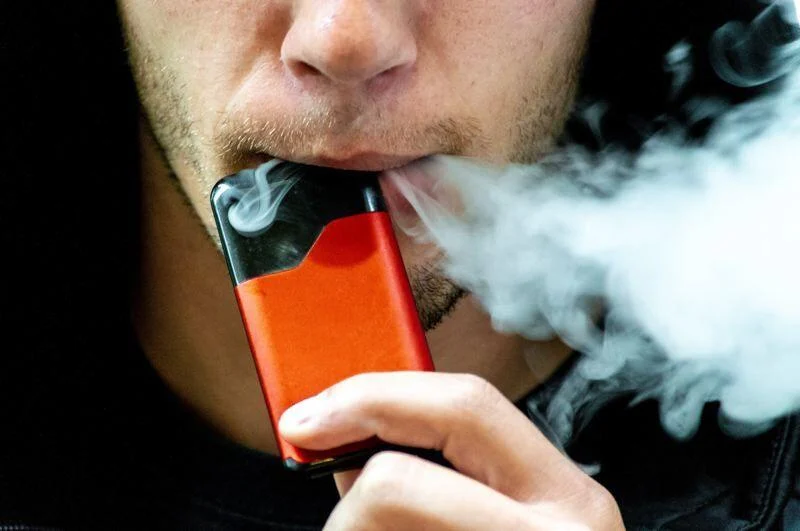
Public health authorities in Oregon and across the U.S. have battled tobacco use for decades, and the percentage of adults and young people who smoke has dropped in the past 20 years.
But flavored e-cigarettes threaten to reverse that trend, a recently published review indicates.
The review, published by JAMA from the American Medical Association, said teenagers are especially prone to take up vaping, and start, on average, at 14. The National Youth Tobacco survey of more than 22,000 students nationwide in 2023 found that 10% of U.S. secondary students vape nicotine, which is more than those who use all other tobacco combined. It also found that nearly 50% of the teens who said they had tried e-cigarettes were currently vaping and that nearly 90% vaped flavored e-cigarettes, which health officials say are targeted at youth.
Oregon has similar trends: A 2022 survey found that 11% of Oregon 11th graders vaped, compared to 3% who said they had smoked cigarettes in the previous month, according to the Oregon Health Authority.
An agency spokesperson, Erica Heartquist, told the Capital Chronicle that 75% of 11th graders who use tobacco consume flavored products. But that appeal wanes with age: Two-thirds of adults in Oregon aged 18 to 24 reported consuming flavored nicotine products, while half that of those 25 to 34 did and only 13% of adults at least 35 years old used flavored products.
E-cigarettes can be easily concealed, allowing teens to use them in a classroom or other supervised setting. They also deliver higher doses of nicotine than traditional cigarettes, posing worrying health threats to youth, the review said.
“Exposure to nicotine during these periods may lead to lasting brain changes,” the review said.
Those changes can make teens more susceptible to becoming addicted to tobacco and serve as a gateway drug, leading to illegal substance use like cocaine, opioids, alcohol and methamphetamine, it said. Nicotine use also affects the brain and is associated with various health problems.
“Vaping products often contain high amounts of nicotine, which can harm brain areas controlling attention, learning, mood and impulse control during adolescence,” Heartquist said in a statement. “Nicotine addiction negatively impacts mental health; causes stress; and affects relationships, school performance and other activities.”
Smoking and vaping are also associated with health problems, including asthma, stroke and lung, cardiovascular and gum disease, the review said.
Like other health issues, minority communities often suffer the most, though the use of e-cigarettes in Oregon is mixed. The state survey found the highest share of e-cigarette use among 11th graders of North African descent (21%), Native Americans and Alaskan Natives (15%) and Hawaiians and Pacific Islanders (15%), compared to 12% of white 11th graders, 11% of Black teens and 9% of Latinos.
The review said teenage vaping poses a “new clinical challenge” and called for effective treatments to minimize the harm of vaping among young people. It said that free text message apps to encourage vaping cessation, like quitSTART and My QuitBuddy, were useful in supporting behavioral changes. It also recommended nicotine replacement therapy, like patches, and anti-smoking medication.
“These treatments should be acceptable in school, allowing students to participate in class, sports and related activities without vaping,” the review said.
The Oregon Health Authority has worked for 25 years to prevent tobacco use and to help people to quit, Heartquist said, noting a 32% decline since 1997 in the percentage of Oregon adults who smoke. But she acknowledged the industry’s production and marketing of flavored products that “hook youth” requires its tobacco prevention program to change its approach.
She didn’t explain how.
The Legislature has taken a few steps against tobacco use by young people, including raising the minimum age for the purchase of these products from 18 to 21. But the industry has gotten around the age limit by selling synthetic nicotine products like flavored pouches, gums, tablets and gummies that are legal for young people to buy, Heartquist said.
A bill that would have banned the sale of all flavored nicotine products statewide stalled during the 2023 legislative session, and local bans in Washington and Multnomah counties are tied up with court challenges.
“As long as addictive nicotine products like vaping products remain appealing and easy to access, youth will continue to use them,” Heartquist said.
Oregon Capital Chronicle is part of States Newsroom, a nonprofit news network supported by grants and a coalition of donors as a 501c(3) public charity.
